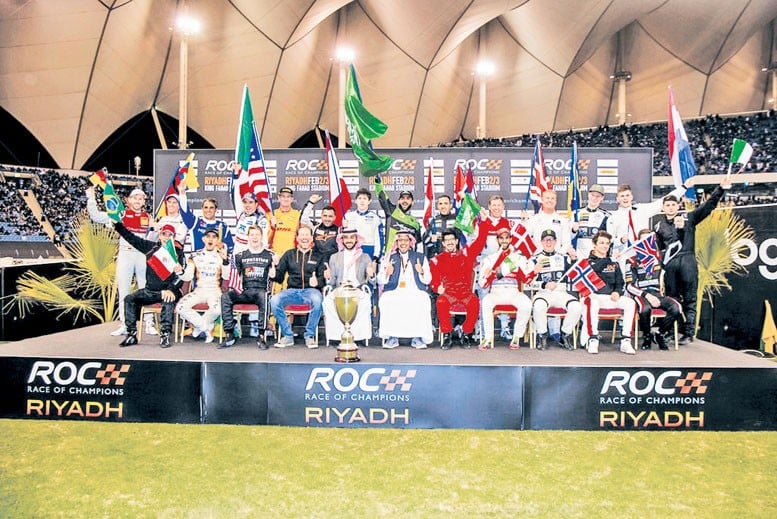
In a major shift, the Saudi government has begun to host major sporting events

Realising the importance of sports as instruments of development and a source of community mobilisation and empowerment, the Kingdom of Saudi Arabia decided to start investing in sports in November 2016. The government ordered the General Authority of Sports to create a sports development fund to augment sports activities in the country and provide financial assistance to sports clubs across the country. The objectives of the fund included an infusion of capital to build new facilities, contributions to the privatisation of sports clubs, and efforts to attract and promote international sports events. With this aim in mind, the oil-rich Saudi Arabia now aims to add 40,000 new jobs by promoting sports as human-intensive industry.
Historically, Saudi Arabia has played a limited role in international competitive sports. Apart from the attention paid towards Saudi soccer clubs, there was minimal investment in Olympic sports and female participation in sports activities. In fact, Saudi Arabia has opposed advancements in athletics. The recent developments seem to represent a significant change in the conservative Islamic nation’s policies.
The man behind the country’s new-found interest in sports is Prince Mohammed Bin Salman, who had yet to be elevated to Crown Prince when he commenced these changes in 2016. At the time, Prince Mohammed Bin Salman was just 31. He was the defense minister and president of the Council of Economic and Development Affairs. Prior to his decision to begin investing in sports, the young prince unveiled Vision 2030, a development plan that laid out a modern, technocratic future for Saudi Arabia in which the country has far less reliance on oil production.
The Vision 2030 was unveiled in April 2016 and by November Prince Mohammed Bin Salman had turned his attention toward strengthening the education system, expanding participation in the workforce, and investing in the sports industry. As a result, the Saudi Arabian government has begun to host major sporting events.
The Vision 2030 represents Saudi Arabia’s plan not only to diversify its economy and address the challenges brought by low global energy prices but also to implement far-reaching social and lifestyle changes. One of the goals of Saudi Vision 2030 is creating a vibrant society with fulfilling lives.
The Saudi Vision 2030 acknowledges that opportunities for playing sports in Saudi Arabia have previously been limited and recognises the importance of sports for health. Saudi Vision 2030 includes the aim of encouraging widespread and regular participation in sports and athletic activities, working in partnership with the private sector to establish additional dedicated facilities and programmes.
In May 2016, the General Presidency for Youth Welfare was renamed the General Authority for Sports with enhanced responsibilities for licensing sports clubs and for the construction of sports facilities.
In August, Saudi Arabia’s Cabinet announced the appointment of Princess Reema Bint Bandar Al Saud, a prominent Saudi Princess, as the head of newly-created Department for Women’s Affairs at the General Authority for Sports. This has been widely seen as signaling potential greater female access to sports in the Kingdom, a country where women’s participation in sports has been relatively low.
Following the appointment of Princess Reema in November 2016, the General Authority for Sports and the prestigious Princess Nora University in Riyadh, the largest women’s university, signed a memorandum of cooperation for the promotion of sports facilities with a view to promote healthy lifestyles by licensing women gyms and constructing exclusive safe play areas for women.
Earlier this year, Saudi Arabia hosted its first international motorsport event, the two-day Race of Champions (ROC).
The event took place at the King Fahd international stadium in Riyadh, which has a capacity of 75,000 seats. ROC President Fredrik Johnsson explained the decision to host the event in Saudi Arabia by claiming that "forward-thinking" ROC is "an event perfectly suited to Saudi Arabia, which is emerging as a modern sports market on the global stage."
Less than three months following the ROC, Saudi Arabia hosted its first international boxing event when the World Boxing Super Series (WBSS) Cruiserweight Final took place in Jeddah. The event, which was held in May 2018, served as the conclusion of the first season of the WBSS and the winner was presented with the inaugural Muhammad Ali trophy.
The princess’ appointment came around the same time when women were allowed entry into soccer stadiums and a ruling that will soon allow women to drive was passed.
The Saudi government is well aware of the domestic benefits and international prestige that can be reaped from developing a strong sports culture.
The decision to invest in sports facilities shows the political will of country’s leadership.
The decision to host international events highlights Prince Mohammed’s interest in using sports as a strategic instrument to enhance the country’s reputation.
Prince Muhammad appeared in public at the opening of Football World Cup match against Russia, which his team lost 5-0, but the Crown Prince had more in his enlightened mind and he very wisely utilised the football politics with some fruitful discussion with Russian President Vladimir Putin before the OPEC meeting.
With Vladimir Putin at the helm of the affairs, Russia won the rights to host both the 2014 Winter Olympic Games and the 2018 Football World Cup. Despite the sanctions imposed by the United States and difficult economic circumstances, Russia’s World Cup, with a budget of $40 billion is the most expensive in football history.
Despite the potential long-term consequences of such a risky investment in a single event, it is a cost Vladimir Putin was willing to pay to ensure his nation claims a spot for itself amongst the international elite. If Prince Muhammad’s plans for promoting sports come to fruition, Saudi Arabia might soon be counting itself among those countries whose international prestige provide much-needed cover for their authoritarian impulses.